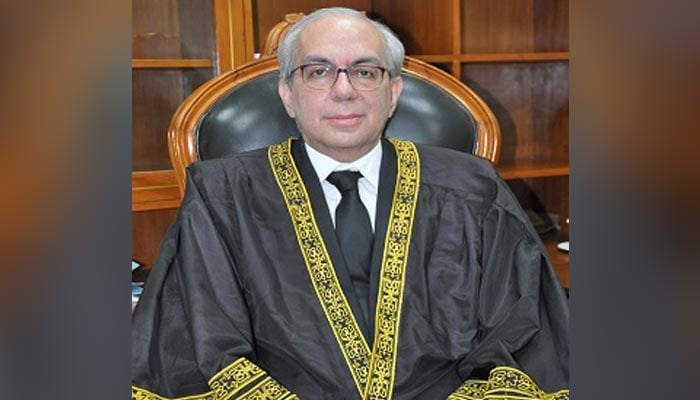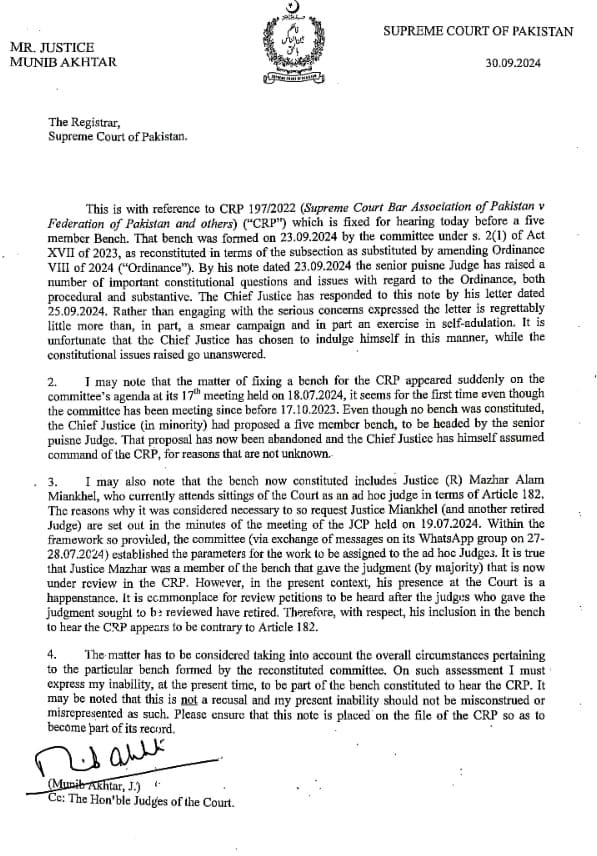Justice Munib Akhtar 'avoids joining' SC bench hearing defection clause plea
CJP Qazi Faez Isa adjourns hearing till tomorrow, saying Justice Munib would be requested to rejoin the bench
ISLAMABAD: Chief Justice of Pakistan (CJP) Qazi Faez Isa on Monday adjourned the hearing of a review petition challenging its ruling on the defection clause under Article 63-A of the Constitution after Justice Munib Akhtar's unavailability.
Headed by CJP Isa, the five-member bench originally had comprised Justice Aminuddin, Justice Jamal Khan Mandokhail, Justice Mazhar Alam, and Justice Munib.
However, as the hearing began today, Justice Munib was unavailable from the bench, following which the CJP adjourned the hearing till tomorrow (Tuesday), saying that the judge would be requested to rejoin the bench.
"We will try to bring Justice Munib Akhtar back to the bench, otherwise, the bench will be reconstituted," said the chief justice.
In his letter, Justice Munib said that he did not recuse from the bench, saying he cannot be a part of a bench that was constituted by Practice and Procedure Committee.
"My letter should be made a part of the case record," said Justice Munib, to which CJP Isa said this could not happen. He added that it would have been appropriate had Justice Munib given his opinion after being part of the bench.
The CJP said that he respects Justice Munib's opinion, however, the case has been pending for more than two years and the Article 63-A case is very important.
Justice Munib Akhtar's letter
Justice Munib, in his letter, noted that the "matter of fixing a bench for the CRP appeared suddenly on the committee's agenda at its 17th meeting held on July 18, it seems for the first time even though the committee has been meeting since before July 17."
"Even though no bench was constituted, the Chief Justice (in minority) had proposed a five member bench, to be headed by the senior puisne Judge. That proposal has now been abandoned and the Chief Justice has himself assumed command of the CRP, for reasons that are not unknown," he wrote.
"I may also note that the bench now constituted includes Justice (R) Mazhar Alam Miankhel, who currently attends sittings of the Court as an ad hoc judge in terms of Article 182. The reasons why it was considered necessary to so request Justice Miankhel (and another retired Judge) are set out in the minutes of the meeting of the JCP held on 19.07.2024.
"Within the framework so provided, the committee (via exchange of messages on its WhatsApp group on 27-28.072C24) established the parameters for the work to be assigned to the ad hoc Judge. It is true that Justice Mazhar was a member of the bench that gave the judgment (by majority) that is now under review in the CRP. However, in the present context, his presence at the Court is a happenstance. It is commonplace for review petitions to be heard after the judges who gave the judgment sought to be reviewed have retired. Therefore, with respect, his Inclusion in the bench to hear the CRP appears to be contrary to Article 182," said Justice Munib.
He requested the matter to be taken into account the overall circumstances pertaining to the particular bench formed by the reconstituted committee.
"On such assessment I must express my inability, at the present time, to be part of the bench constituted to hear the CRP. It may be noted that this is not a recusal and my present inability should not be misconstrued or misrepresented as such. Please ensure that this note is placed on the file of the CRP so as to become Part of its record," he wrote.
SC judgement
The SCBA in 2022 approached the Supreme Court, seeking a review on the interpretation on Article 63(A) pertaining to the treatment of dissidents.
The SC, while wrapping up the presidential reference seeking interpretation on Article 63(A) had ruled on May 17, 2022 that the votes of dissident members of Parliament (MPs), cast against their parliamentary party's directives, cannot be counted.
In a split decision, three judges — then-CJP Umar Ata Bandial, Justice Ijazul Ahsan, and Justice Munib — agreed that dissident members' votes should not be counted.
Meanwhile, Justice Mandokhail and Justice Mazhar disagreed with the verdict.
The SCBA filed a plea moving the apex court to take back its opinion on the verdict's paragraph about not counting the votes of dissidents by reviewing the interpretation made on May 17, 2022. It maintained that the dissidents should only be de-seated but their votes are supposed to be counted as per the Constitution of Pakistan.
"The apex court's opinion about not counting the dissident's votes is against the Constitution and equal to interference in it," the SCBA stated in the plea.
What is Article 63(A)?
Article 63(A) of the Constitution of Pakistan deals with the defection of parliamentarians.
According to the article, a lawmaker can be disqualified on the grounds of defection if they vote or abstain from voting in the House contrary to any direction issued by the parliamentary party to which they belong.
However, this is restricted to three instances where they have to follow the party’s directions:
- Election of the prime minister or chief minister;
- Vote of confidence or a vote of no-confidence;
- Money bill or a Constitution (amendment) bill.
Per the article, the head of the party is required to present a written declaration that the MNA concerned has defected.
However, prior to presenting the declaration, the head of the party will have to give the MNA concerned a chance to explain the reasons for defection.
Following that, the party chief will then forward the written declaration to the speaker, who would, in turn, hand it over to the chief election commissioner (CEC).
The CEC will have 30 days at their disposal to confirm the declaration. Once confirmed, the MNA concerned will no longer be a member of the House and their “seat shall become vacant".
-
Security forces gun down 30 terrorists in multiple IBOs in KP: ISPR
-
MQM-P calls for new province in Sindh
-
US report validates Pakistan military edge over India: PM
-
Banned TTP poses serious threat to Pakistan security: UNSC panel
-
CM Afridi clarifies remarks on by-poll after ECP requests army deployment
-
Dubai sees 3.2m Pakistani passengers in 2025 as airport sets new milestone
-
Security forces kill 23 Indian proxy terrorists in KP's Kurram
-
Pakistan to construct island to boost oil exploration: report













